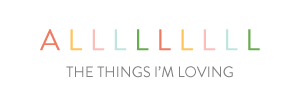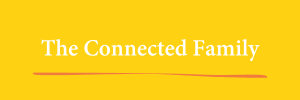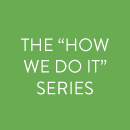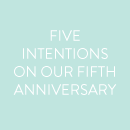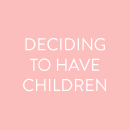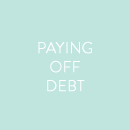How to unhurry your life
While I don’t plan to write about every book on my 2020 reading list, I just couldn’t not share my thoughts on this one – and invite yours! My copy of The Ruthless Elimination of Hurry has been underlined, dog-eared, read aloud to John, discussed with friends, applied to my life, and recommended several times over just within my first month of reading it. Let’s dig in :)
First, a brief overview. John Mark Comer (we’ll call him JMC) sub-titled his book “how to stay emotionally healthy and spiritually alive in the chaos of the modern world.” It’s divided into three sections — the problem, the solution, and four practices for unhurrying your life — with a bonus section defining spiritual disciplines. I found it to be a pretty quick read, except for the fact that I wanted to share something aloud with John every few pages.
In the first section, JMC outlines where we find ourselves today: “throwing our lives away” as we live spiritually-mediocre days, days spent in “irritation and fear and self-preoccupation and frenzy.” He traces the rise of many compounding factors, like the disappearance of Sabbath and the explosion of smart phones, that are resulting in “hurry sickness” (the symptoms include hypersensitivity, restlessness, nonstop activity, emotional numbness, out-of-order priorities, and isolation). A quote I underlined:
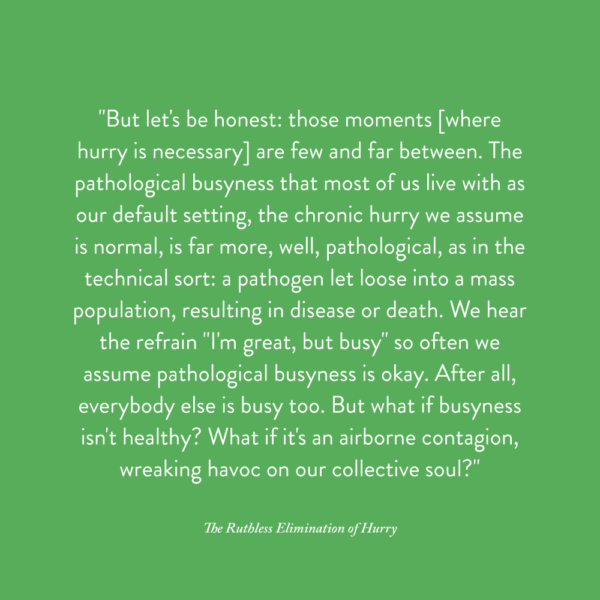
Even as I found myself nodding along with most of what JMC was writing (this is my jam!), not much of what he shared was new to me – I was already familiar with most of the trends, studies, and articles he was referencing. (And he referenced a LOT – this section almost read like a compilation of other people’s thoughts versus an original work, which felt a little cheap.) But, if the background on the “hurry era” is new to you, this section would probably be eye-popping.
Interestingly, the first section had many similarities to the infamous “millennial burnout” article, except for one glaring difference: where that article ended without positing a solution, this book does: Jesus and his easy yoke. In the second section, he writes, “the solution to an overbusy life is not more time. It’s to slow down and simplify our lives around what really matters.”
(He argues that if we all had 10 more hours in a day, we’d just fill them up with more “good” things, and then we would be “even more tired and burned out and emotionally frayed and spiritually at risk” than we are now. This rings true for me — if we don’t exercise restraint around our allotted 24 hours, why would we with 34 hours? It’s the same with our money – if we can’t manage a small amount well, why would we suddenly do better with a large amount?)
JMC’s solution to hurry is Jesus, and to organize our lives around three basic goals:
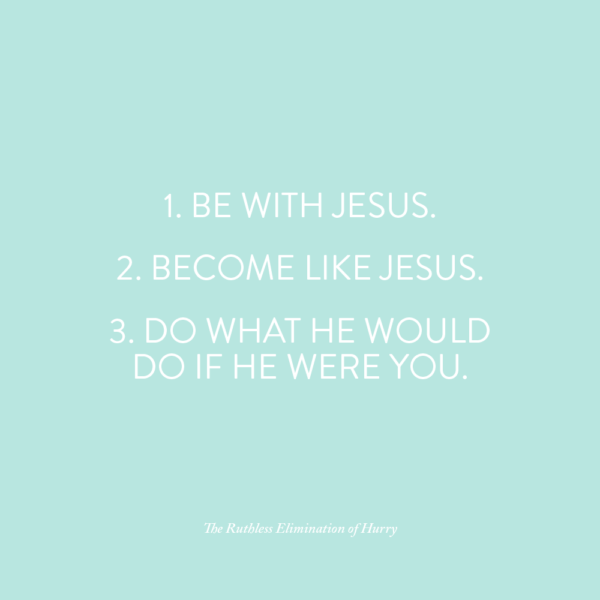
“We read the stories of Jesus,” JMC writes, “his joy, his resolute peace through uncertainty, his unanxious presence, his relaxed manner and how in the moment he was — and think, I want that life. We hear his open invite to ‘life… to the full’ and think, Sign me up. We hear about his easy yoke and soul-deep rest and think, Gosh, yes, heck yes. I need that. But we’re not willing to adopt his lifestyle.”
“That’s why Jesus doesn’t offer us an escape. He offers us something far better: ‘equipment.’ He offers his apprentices a whole new way to bear the weight of our humanity: with ease. At his side. Like two oxen in a field, tied shoulder to shoulder. With Jesus doing all the heavy lifting. At his pace. Slow, unhurried, present to the moment, full of love and joy and peace.”
If we’re willing to consider a new yoke – a fresh way to bear our responsibilities, not to escape from them – he has four suggestions in the final section. They are: silence and solitude, Sabbath, simplicity, and slowing. This section was by my favorite of the book – it was practical, challenging, and gave me lots of good ideas to try in my day-to-day. It also connected the dangers of our distracted age (of which I consider myself well aware) to my spiritual life, a connection I haven’t always made clearly:
“The noise of the modern world makes us deaf to the voice of God,” JMC writes, “drowning out the one input we most need. I mean, how do we have any kind of spiritual life at all if we can’t pay attention longer than a goldfish? How do you pray, read the Scriptures, sit under a teaching at church, or rest well on the Sabbath when every chance you get, you reach for the dopamine dispenser that is your phone?” This is why our relationships with our phones matter. It’s not only about our phones and how much we do or do not use them and what affect that has on us and the people around us. It matters because it degrades our ability to do things — really important things! — that have nothing at all to do with our phones.
Needless to say, I loved this book and will be grappling with it for quite some time. As I figure out what, exactly, it means for my own life, here is something that I’ve been turning over in my mind, and I wonder if you’ve been seeing the same.
Lately, I feel like I’ve been reading more and more about slowing and a “friction-full” (versus friction-less) life. About people choosing the analog, the stubbornly old-school, the path of most resistance. Washing your car in the driveway instead of taking it through the carwash. Walking the aisles of the grocery store instead of using InstaCart. Sitting in the cul-de-sac while your kids run around instead of running them to three different after-school activities. Shutting down Instagram for days or weeks at a time.
This mood seems a direct backlash to the rapid rise of convenience life, apps, and services that facilitate our hurry: businesses that will help us walk our dog or buy our groceries or deliver a new gadget from Amazon in 24 hours or watch something on-demand. JMC noticed it, too: “you will find more and more teachers of the way talking about the emerging practice of the spiritual discipline of ‘slowing’ as a protest against the new normal of hyperliving. Ortberg defined it as ‘cultivating patience by deliberately choosing to place ourselves in a position where we simply have to wait.'”
In the slowing chapter, JMC suggests 20 ideas for slowing down your overall pace of life, and takes some time to talk about each of them (they include driving the speed limit, getting into the literal slow lane, killing your TV, and setting times for email). I’m always game for a little social experiment and found this section thought-provoking and engaging. John, however, was generally not into it: for example, one of JMC’s suggestions is to deliberately choose the longest lane at the grocery store. He has what I think is a beautiful reason for it in the book, and it resonated with me. However, when I read it aloud to John, he thought it was kind of silly. His response: “why would I want to choose the slowest lane at the grocery store when it’s keeping me from getting home to my family/playing outside/relaxing at home/anything better than waiting in line?”
And that’s, I suppose, where I’ve landed. Modern conveniences aren’t bad or good. The slow lane is not bad or good. Inspired by JMC, the question I’ve been trying to ask myself, even in the seemingly-mundane, is “who am I becoming by making this choice?” Someone who has the space to hear from God? Someone who is more present and compassionate? Someone who indulges in curiosity and wonder? Someone who is able to sit quietly, still, and dig in the sandbox or read a book or have a conversation for an hour or two? The right choice could be ordering groceries so I can go on a walk with my kids, or it could be taking my kids to the grocery store and chatting our way through the aisles — but if I choose an answer that is as faithful as possible to what Jesus would do if he were me, then that’s the right question to be asking.
Anyway. That’s a lot of thoughts :) I acknowledge that this micro-trend of “slowing” and forgoing technological conveniences might just be an anomaly of my little social circle, but I’d love to hear what you think. Have you noticed this? Is it something you consider in your own life? Where do you fall on the convenience versus analog spectrum? As always, looking forward to hearing what you think!
Affiliate links are used in this post!







